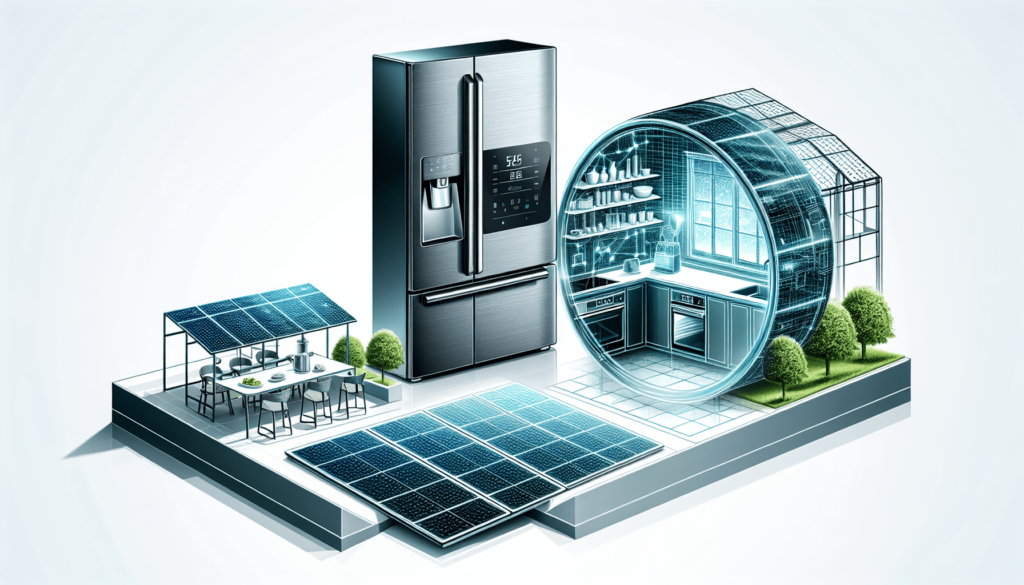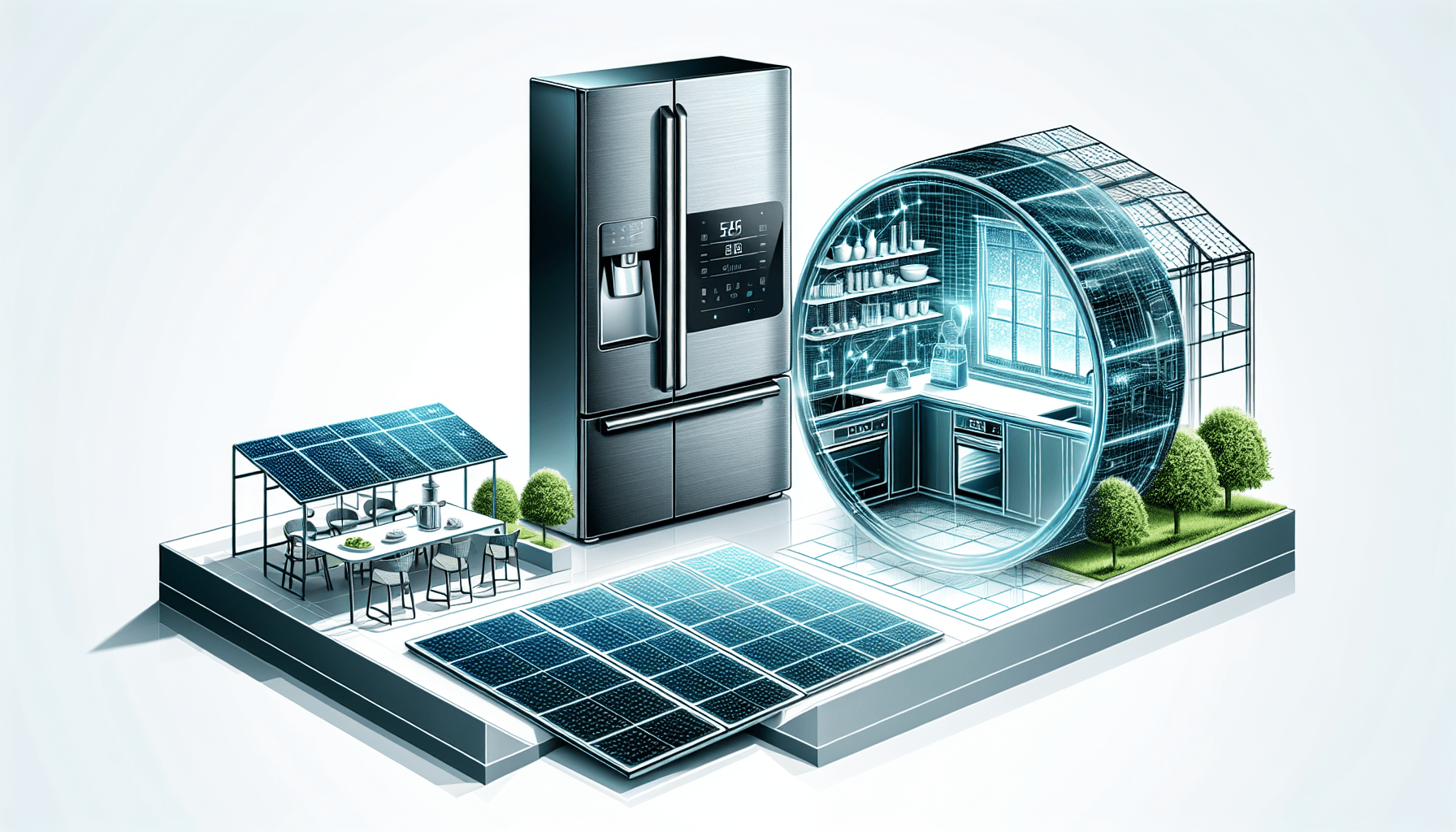In a world where sustainability and environmental consciousness are becoming increasingly important, the future of eco-friendly home appliances holds immense potential. With advancements in technology and a growing awareness of the need for energy-efficient solutions, these appliances are revolutionizing our homes. From smart thermostats that adjust based on your preferences and reduce energy consumption to solar-powered refrigerators that minimize carbon footprints, the future of eco-friendly home appliances promises a greener and more sustainable tomorrow. By adopting these innovative and environmentally friendly appliances, you can contribute to the preservation of our planet while enjoying the convenience and comfort of modern living.

Smart Home Technology
Integration of eco-friendly features
With the rapid advancement of technology, smart home systems are becoming increasingly popular. These systems not only provide convenience and comfort but also contribute to a more sustainable lifestyle. The integration of eco-friendly features in smart home technology allows homeowners to monitor and control their energy consumption effectively. By connecting various appliances and devices to a centralized system, you can easily track your energy usage and make adjustments to ensure optimal efficiency. This integration of eco-friendly features empowers you to minimize wastage and reduce your carbon footprint, ultimately leading to a greener and more sustainable home.
Energy-efficient home monitoring systems
Energy-efficient home monitoring systems are an essential component of smart home technology. These systems enable you to monitor your electricity, water, and gas consumption in real-time, providing valuable insights into your energy usage patterns. By understanding how and when you consume energy, you can identify areas where improvements can be made to increase efficiency. With smart home monitoring systems, you can receive alerts and notifications whenever there’s unusual energy consumption, allowing you to take immediate action and rectify any issues. This feature not only helps you reduce energy wastage but also provides significant cost savings on utility bills.
Connected appliances for energy management
Connected appliances play a pivotal role in energy management within a smart home ecosystem. These appliances can be controlled remotely through a mobile app, allowing you to adjust settings and monitor energy usage even when you’re away from home. For example, you can turn off lights, adjust thermostat settings, or control the operation of appliances such as washing machines and refrigerators to minimize energy consumption during peak hours. By integrating these appliances into a centralized system, you can efficiently manage your energy usage and contribute to a greener environment.
Renewable Energy Sources
Solar-powered home appliances
Solar power is one of the most abundant and sustainable sources of energy available to us. In recent years, there has been a significant focus on harnessing solar energy for powering home appliances. Solar-powered home appliances, such as solar water heaters, solar panels for electricity generation, and solar air conditioning systems, are becoming increasingly popular. These appliances utilize energy from the sun, reducing dependency on traditional energy sources and minimizing greenhouse gas emissions. By embracing solar power in your home, you not only reduce your carbon footprint but also enjoy long-term energy cost savings.
Wind energy utilization in home appliances
Harnessing the power of wind energy is another promising avenue for eco-friendly home appliances. Wind turbines can be installed in residential areas to generate electricity and power various home appliances. While larger wind turbines are typically used for large-scale power generation, smaller turbines designed for home use are becoming more accessible. These turbines can be installed on rooftops or in open spaces to capture wind energy efficiently. By utilizing wind energy, homeowners can tap into a renewable energy source and contribute to the overall reduction of greenhouse gas emissions.
Geothermal heating systems
Geothermal heating systems utilize the earth’s natural heat to provide efficient heating and cooling for homes. This eco-friendly heating solution takes advantage of the stable temperature underground to regulate the temperature of your home. By installing a geothermal heat pump, you can extract heat from the ground during the colder months and transfer it into your home. During warmer months, the system works in reverse, effectively cooling your home by transferring heat back into the ground. Geothermal heating systems are highly energy-efficient, reducing reliance on traditional heating and cooling methods and ensuring a more sustainable approach to home comfort.
Energy-Efficient Cooling and Heating
Smart thermostats for precise temperature control
Smart thermostats are revolutionizing the way we control the temperature in our homes. These intelligent devices not only provide precise temperature control but also enable energy optimization. Equipped with advanced sensors and learning capabilities, smart thermostats can analyze patterns in your temperature preferences and adjust accordingly to maximize energy efficiency. For example, if you tend to keep your home cooler at night, a smart thermostat can learn this preference and adjust the temperature accordingly, ensuring optimal comfort while minimizing unnecessary energy consumption.
Heat pumps for efficient heating and cooling
Heat pumps are a highly efficient heating and cooling solution for eco-friendly homes. Unlike traditional heating and cooling systems that generate heat or cold air, heat pumps work by transferring heat from one area to another. During winter, heat pumps extract heat from the outside air or the ground and transfer it into your home. In the summer, the process is reversed, removing heat from your home and releasing it outside. This method of heat transfer significantly reduces energy consumption compared to conventional heating and cooling systems, making heat pumps a sustainable choice for homeowners.
Radiant heating systems
Radiant heating systems provide an energy-efficient and comfortable alternative to traditional forced-air heating systems. Instead of relying on air circulation to heat your home, radiant systems deliver heat through the floor, walls, or ceiling. This method ensures even distribution of heat, eliminating cold spots and reducing energy wastage. Radiant heating systems can be powered by various energy sources, including electricity, solar energy, or geothermal energy, making them versatile and eco-friendly options for heating your home.
Water Saving Appliances
Low-flow faucets and showerheads
Water conservation is a critical aspect of eco-friendly living. Low-flow faucets and showerheads are designed to minimize water usage without compromising water pressure or the overall showering and washing experience. These fixtures reduce the flow rate of water, allowing you to save significant amounts of water without sacrificing comfort or convenience. By incorporating low-flow faucets and showerheads into your home, you contribute to water conservation efforts, reduce water bills, and preserve this precious natural resource.
High-efficiency toilets
Traditional toilets can be significant water wasters, using up to several gallons of water with each flush. High-efficiency toilets (HETs) are specially designed to reduce water consumption while still maintaining effective flushing capabilities. With innovative flushing technologies, HETs provide sufficient water flow and force while using significantly less water. By switching to high-efficiency toilets, you can save gallons of water per day, significantly reducing your household’s water footprint and promoting sustainable water usage.
Greywater recycling systems
Greywater recycling systems offer a sustainable solution for reusing wastewater within your home. Greywater refers to gently used water from sinks, showers, and washing machines that can be recycled for purposes such as landscape irrigation and toilet flushing. By installing a greywater recycling system, you can divert this water from being wasted and repurpose it for other needs. This not only conserves water but also reduces the strain on the local water supply and wastewater treatment systems. Greywater recycling is a proactive step towards sustainable water management and contributes to the overall reduction of water consumption.

Waste Management Solutions
Smart trash compactors
Smart trash compactors revolutionize waste management and promote eco-friendly practices. These innovative appliances use advanced sensors and technology to compact the trash, reducing its volume and optimizing waste disposal. By compacting the trash, smart trash compactors minimize the frequency of waste removal, saving time and reducing the number of trash bags used. This not only promotes efficient waste management but also reduces the environmental impact associated with waste transportation and disposal.
Composters for organic waste
Composting is a sustainable practice that allows organic waste to decompose naturally and transform into nutrient-rich compost. Composters designed for home use make composting accessible and hassle-free. These devices enable you to compost food scraps, yard waste, and other biodegradable materials, reducing the amount of waste sent to landfills. Composting not only reduces greenhouse gas emissions but also produces nutrient-rich compost that can be used to nourish gardens and plants. By incorporating composters into your waste management routine, you contribute to a circular economy and take a proactive role in reducing waste.
Recycling systems integrated into appliances
Appliances equipped with integrated recycling systems help streamline the recycling process and encourage eco-friendly practices. For example, refrigerators and trash compactors with separate compartments or bins for recyclables allow you to easily separate recyclable materials from general waste. This feature promotes recycling habits by making it more convenient and straightforward for users to participate in recycling efforts. By embracing appliances with integrated recycling systems, you can actively contribute to waste reduction and the preservation of natural resources.
Green Materials and Design
Sustainable and recyclable materials for appliances
Appliance manufacturers are increasingly adopting sustainable and recyclable materials in their production processes. From refrigerators to dishwashers, eco-friendly appliances are constructed using materials that minimize environmental impact throughout their lifecycle. Materials like bamboo and stainless steel offer durability and eco-friendliness, while recycled plastics and glass reduce the need for new raw materials. By choosing appliances made from sustainable and recyclable materials, you invest in products that are kinder to the planet and contribute to the reduction of waste and resource depletion.
Modular and compact designs for space optimization
Space optimization is a crucial aspect of green living, especially in urban areas with limited living space. Appliances with modular and compact designs offer a practical solution without compromising functionality. These appliances are designed to fit seamlessly into smaller spaces, making them ideal for apartments or tiny homes. By choosing modular appliances, you can maximize the efficiency and utility of your living space while minimizing the energy and resource requirements for manufacturing and transportation.
Energy-efficient lighting solutions
Lighting plays a significant role in energy consumption within a household. Energy-efficient lighting solutions, such as LED bulbs and smart lighting systems, contribute to a greener home environment. LED bulbs consume significantly less energy while providing the same level of brightness as traditional incandescent bulbs. By replacing incandescent bulbs with LED alternatives, you can save energy and reduce your carbon footprint. Additionally, smart lighting systems allow you to control your lights remotely and adjust brightness levels to optimize energy usage. These lighting solutions not only offer energy savings but also enhance the overall ambiance and comfort of your home.
Smart Grid Integration
Real-time energy consumption monitoring
Smart grid integration enables real-time monitoring of energy consumption within the household. By connecting to the local energy grid, smart home systems can gather data on your energy usage and provide accurate and up-to-date information. With real-time energy consumption monitoring, you gain a comprehensive understanding of your energy usage patterns and can identify areas where energy conservation can be improved. By actively monitoring your energy consumption, you can make informed decisions to reduce wastage, lower your carbon footprint, and contribute to sustainable living.
Demand response systems for energy optimization
Demand response systems allow homeowners to actively participate in energy conservation efforts. These systems work by adjusting energy consumption based on the current demand on the grid. For example, during peak demand periods, appliances and devices can be programmed to reduce their energy usage or operate at lower power settings. This flexibility helps balance the load on the grid and ensures a more efficient and sustainable distribution of energy. By embracing demand response systems, you become an active participant in energy optimization and contribute to the stability of the grid.
Appliance scheduling and automation
Appliance scheduling and automation features empower homeowners to optimize energy usage based on their specific needs and preferences. For instance, you can schedule your dishwasher or washing machine to operate during off-peak hours when the electricity rates are lower. Additionally, you can automate appliances to turn off when not in use or adjust their settings to maximize energy efficiency. By implementing appliance scheduling and automation, you can align your energy usage with times of lower demand and reduce energy wastage, ultimately leading to a more sustainable home.
Advancements in Battery Technology
Longer-lasting and eco-friendly batteries
Advancements in battery technology have led to longer-lasting and more sustainable batteries for various applications. For home appliances, longer-lasting batteries reduce the number of battery replacements, minimizing waste and reducing the environmental impact. Additionally, eco-friendly battery technologies focus on using non-toxic materials and employing sustainable production methods. By embracing appliances with longer-lasting and eco-friendly batteries, you promote a more sustainable approach to energy storage and reduce the overall environmental footprint associated with batteries.
Battery storage for renewable energy utilization
Battery storage allows homeowners to store excess energy generated from renewable sources, such as solar panels or wind turbines, for later use. This technology enables homeowners to have a reliable energy source even when the sun isn’t shining or the wind isn’t blowing. By storing excess renewable energy in batteries, you can maximize the utilization of clean energy and reduce dependency on the grid. Battery storage also provides the flexibility to use stored energy during peak demand hours, contributing to more efficient energy management and reducing strain on the grid.
Wireless charging options
Wireless charging technology eliminates the need for cords and cables, providing a convenient and eco-friendly way to charge appliances. By simply placing an appliance on a wireless charging pad or dock, you can efficiently charge the device without the hassle of tangled cables. Wireless charging technology reduces energy waste by minimizing standby power consumption and eliminating the need for disposable batteries. By embracing wireless charging options, you contribute to a cleaner and more organized living space while reducing the environmental impact associated with traditional charging methods.
Automation and Artificial Intelligence
Smart appliances with learning capabilities
Automation and artificial intelligence (AI) play a significant role in the future of eco-friendly home appliances. Smart appliances equipped with learning capabilities can adapt to your lifestyle and usage patterns, optimizing energy consumption. These appliances can analyze your habits, preferences, and energy needs to make intelligent decisions and automatically adjust settings accordingly. For example, a smart refrigerator can learn your grocery shopping patterns and adjust its cooling settings to minimize energy usage when the door is frequently opened. By investing in smart appliances with learning capabilities, you can enjoy increased energy efficiency and personalized comfort.
Appliance coordination for optimized energy usage
Appliance coordination is an important aspect of smart home automation. By integrating various appliances within a centralized system, these devices can coordinate their operations to optimize energy usage. For instance, when you leave your home, the system can communicate with all connected appliances to ensure they are turned off or operating in energy-saving mode. Similarly, appliances can coordinate their functions to avoid overlapping operations, minimizing energy consumption. By synchronizing the actions of your appliances, you can improve energy efficiency and achieve a more sustainable and streamlined home environment.
Virtual assistants for appliance control
Virtual assistants, such as Amazon Alexa or Google Assistant, offer a user-friendly and convenient way to control and manage your appliances. By simply using voice commands, you can turn on or off appliances, adjust settings, and monitor energy usage. Virtual assistants can also provide energy-saving tips, suggest optimal settings for your appliances, and provide real-time information on your energy consumption. By utilizing virtual assistants for appliance control, you can enhance your home automation experience while promoting energy efficiency and sustainability.
Education and Awareness Programs
Promotion of eco-friendly practices in appliance usage
Education and awareness programs play a vital role in promoting eco-friendly practices in appliance usage. These programs aim to inform and educate homeowners about the environmental impact of their actions and provide guidance on sustainable practices. Through educational initiatives, individuals can learn about energy-efficient appliances, water conservation, waste management, and other eco-friendly practices. By raising awareness and encouraging behavioral changes, these programs empower individuals to make informed decisions and actively contribute to a greener and more sustainable future.
Consumer education on energy-saving features
Consumer education is crucial in ensuring that homeowners understand and utilize the energy-saving features of their appliances effectively. Manufacturers and organizations can provide comprehensive guides and resources to educate consumers on the various energy-saving features available in appliances. These resources can include online tutorials, user manuals, and interactive platforms that explain how to optimize energy usage. By equipping consumers with the knowledge to make the most of energy-saving features, appliance manufacturers promote a culture of energy conservation and empower individuals to take a proactive role in reducing energy consumption.
Incentives for eco-friendly appliance purchases
Incentivizing eco-friendly appliance purchases can accelerate the adoption of sustainable technologies. Governments, utility companies, and appliance manufacturers can offer various incentives to encourage consumers to choose energy-efficient and environmentally friendly appliances. These incentives can include tax credits, rebates, or discounted utility rates for homeowners who invest in energy-saving appliances. By providing financial incentives, individuals are motivated to make eco-friendly choices, leading to a widespread adoption of sustainable appliances and a significant reduction in energy consumption and environmental impact.
In conclusion, the future of eco-friendly home appliances holds exciting possibilities for a greener and more sustainable lifestyle. The integration of smart home technology, renewable energy sources, energy-efficient cooling and heating, water-saving appliances, waste management solutions, green materials and design, smart grid integration, advancements in battery technology, automation and artificial intelligence, and education and awareness programs all contribute to a more eco-friendly home environment. By embracing these innovations and making conscious choices, homeowners can actively contribute to a sustainable future and enjoy the benefits of reduced energy consumption, lower utility bills, and a healthier planet.

